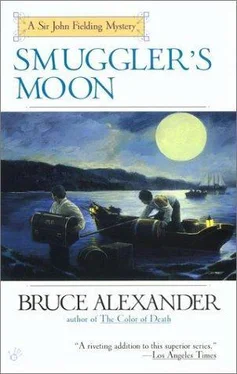Bruce Alexander - Smuggler's Moon
Здесь есть возможность читать онлайн «Bruce Alexander - Smuggler's Moon» весь текст электронной книги совершенно бесплатно (целиком полную версию без сокращений). В некоторых случаях можно слушать аудио, скачать через торрент в формате fb2 и присутствует краткое содержание. Жанр: Исторический детектив, на английском языке. Описание произведения, (предисловие) а так же отзывы посетителей доступны на портале библиотеки ЛибКат.
- Название:Smuggler's Moon
- Автор:
- Жанр:
- Год:неизвестен
- ISBN:нет данных
- Рейтинг книги:4 / 5. Голосов: 1
-
Избранное:Добавить в избранное
- Отзывы:
-
Ваша оценка:
- 80
- 1
- 2
- 3
- 4
- 5
Smuggler's Moon: краткое содержание, описание и аннотация
Предлагаем к чтению аннотацию, описание, краткое содержание или предисловие (зависит от того, что написал сам автор книги «Smuggler's Moon»). Если вы не нашли необходимую информацию о книге — напишите в комментариях, мы постараемся отыскать её.
Smuggler's Moon — читать онлайн бесплатно полную книгу (весь текст) целиком
Ниже представлен текст книги, разбитый по страницам. Система сохранения места последней прочитанной страницы, позволяет с удобством читать онлайн бесплатно книгу «Smuggler's Moon», без необходимости каждый раз заново искать на чём Вы остановились. Поставьте закладку, и сможете в любой момент перейти на страницу, на которой закончили чтение.
Интервал:
Закладка:
“If that is your view, sir, then I daresay we have finished,” said Eccles in a manner rather sullen. ”I would not take up more of your valuable time.”
Sir John, who had learned the room with no difficulty, squeezed round the desk and made it across the room to the door. There I offered him my arm, and we two waited that Mr. Eccles might exit before us. In truth, he had little choice.
At the door to the street Clarissa awaited us, quite beside herself with excitement.
“You’ve no idea what’s out there,” said she to one and all. ”You’d not get it right with a hundred guesses.”
Sir John put a forefinger to his lips, asking for silence. Clarissa assented with a nod. Mr. Eccles, having heard thus much, sprang to the door and, unwilling to wait, threw it open and gasped at what he saw.
“Good God,” he cried aloud, ”they’re here! The Chancellor of the Exchequer granted my petition, after all!”
He was so transported by the congregation of horses and men just outside the door that for a moment or two all he could do was stand there in the doorway, his hands clasped before him, and gloat loudly, ”They’re mine, they’re mine.”
He did, in fact, speak so loudly that he attracted the attention of a group of soldiers nearby. One of them turned round and looked curiously at Mr. Eccles and Sir John. It was not, however, until he separated himself from the rest and started toward us that I saw that the man who approached was Lieutenant Tabor, who had played a role in the Dingendam matter. He gave a casual salute and proceeded to address Sir John.
“We are perhaps a little later than expected, sir. For that I beg your pardon most sincerely, but we-”
As this was said, Mr. Eccles began, subtly at first, to intrude himself into Lieutenant Tabor’s line of vision. By the time I did notice, he seemed truly to be attempting to elbow Sir John aside.
“Young man … uh, lieutenant,” said he, ”I believe you’ve made a mistake. It’s me you wish to address, if I’m not mistaken. My name-as you will see if you check your orders-is George Eccles. I am the Chief Customs Officer for eastern Kent.”
“Oh no, sir, I fear not, sir,” said Lieutenant Tabor. ”I know my orders well, and they direct me to Sir John Fielding at this house in Middle Street-Number Eighteen.”
“But-”
“And indeed I know Sir John well enough, for I assisted him in another matter quite recently, and so you see, sir, I have made no mistake.”
“Now, don’t be impertinent, young man.”
“I was not aware of any impertinence on my part, sir.”
“But you should be aware that I submitted a request to the Chancellor of the Exchequer, no less, for just such a mounted contingent as this one here. And so it stands to reason, does it not, that this must be my mounted contingent? Don’t you understand? I need cavalry to chase the smugglers. I can only conclude that the orders you have been given were wrong. Mistaken. Misdirected.”
All through this wrangle, during which Mr. Eccles grew increasingly strident in his representations, Sir John had listened with an amused smile upon his face, saying nothing. Yet during this last speech the smile faded. What seemed to offend was Eccles’s assertion that because the lieutenant’s orders were not as he would have them, then the orders must be wrong. This was simply too much for Sir John. It was, of a sudden, time to lodge a protest.
“Enough!” said he with a great shout, which silenced all. ”Mr. Eccles, your argument is pure nonsense. You tell Lieutenant Tabor to forget his orders because they are not consonant with your desires. Well, that, sir, is nonsense and not near good enough. If you hope to have your way, then you must write to the Chancellor of the Exchequer, explain the situation, and get from him some written document that is endorsed by the Commander of the Tower which states that these particular troops are transferred to your command. Until you can present such, you are to trouble neither me, nor the lieutenant, nor any of his men further. Good day to you, sir.”
Mr. Eccles did not respond to that, though it was not for want of trying. He stood rigid and red-faced, stuttering and sputtering, unable to complete or even begin a sentence. Thus did he for a minute, or maybe even two, as Sir John waited most patiently. At last, however, Eccles surrendered to circumstance, turned, and beat a swift retreat down Middle Street. Looking after him, the lieutenant permitted himself a smile. From his men, however, who had listened carefully to all that was said, a few chuckles and snorts were heard.
Sir John listened to Eccles’s footsteps fade, then did he call out to the assemblage: ”Mr. Crawly, will you please come forward?”
And so did the driver of the hackney work his way through the assemblage of men and horses to greet Sir John most respectfully.
“What will you, sir?” he asked. ”Where can I take you?”
“Nowhere for now, though I do have a proper and important journey for you.”
“From here to where?”
“From here to the residence of Sir Simon Grenville. I want you to lead this small troop of mounted Carabineers up there that they may pitch their tents upon his front lawn and water their horses in the brook that runs through it.” He paused to think a moment. ”I did hear a brook up there on our approach to his door, did I not, Jeremy?”
“You did, Sir John,” said I.
“That should do nicely, don’t you think so, lieutenant?” ”Oh, well enough, I’m sure,” responded Lieutenant Tabor.
“Though I must ask you to remain here with me, whilst I explain to you our situation here. You may join your men later. And you, Mr. Crawly-”
“Yes sir?”
”I would have you return here once you have the Carabineers situated in Sir Simon’s great dooryard, for we shall have further need of you, the lieutenant and I. We three have plans to make.”
“Well and good, sir,” said Mr. Crawly. ”I have but one question for you.”
“And what is that?”
“Does Sir Simon know that these army gents will be staying with him as his guests?”
Sir John smiled. ”In all truth, he does not. Still, as the biggest landholder in these parts, he should not be surprised if, from time to time, he has official guests drop in. If he protests vigorously, just tell him that Lord Mansfield sent these troops down to help Sir John Fielding in the discharge of his duties. You may pass that word on to the troops.”
This time I was privy to the plan as it was made. I sat and listened to Sir John outline it. I bent over the map with them as Mr. Crawly chose the best place for a roadblock. I heard Lieutenant Tabor’s comments on the difficulty of following a train of wagons undetected. In short, I saw that as I had suspected, this was very likely the plan that Sir John had worked through with Dick Dickens late into the night before. How Dickens had come by the information upon which it was based I had no idea.
My suspicion that he was co-author and prime mover of the plan was confirmed when, at the end of the afternoon session, Sir John dictated to me a memorandum, giving all details, which was to be delivered into the hands of Dick Dickens only. Thus had I an opportunity to enter Deal Castle, which I had wished to do ever since first I spied it.
It was to my mind no proper castle at all, for it had neither turrets nor towers. It did, however, have a moat with a bridge across it which could be raised to make unwanted entry impossible. The bridge was down, as one might have expected, and I strode across it in a manner more confident than I felt. At the arched entrance I was challenged and halted by a soldier dressed in odds and ends-or one who was more likely a member of some local militia detailed to guard the castle against unauthorized visitors; he was, in any case, a man with a musket, and I thought it unwise to disobey him. I stopped, as ordered, and gave my name to him and told him whom I wished to visit. This information was passed on to another just inside the castle who ran off to deliver it to the proper place and person. I had no choice but to wait. Upon his return, he invited me to follow him and thus did serve as my guide through the narrow corridors and descending stairs which led ultimately to the office of the Customs Service.
Читать дальшеИнтервал:
Закладка:
Похожие книги на «Smuggler's Moon»
Представляем Вашему вниманию похожие книги на «Smuggler's Moon» списком для выбора. Мы отобрали схожую по названию и смыслу литературу в надежде предоставить читателям больше вариантов отыскать новые, интересные, ещё непрочитанные произведения.
Обсуждение, отзывы о книге «Smuggler's Moon» и просто собственные мнения читателей. Оставьте ваши комментарии, напишите, что Вы думаете о произведении, его смысле или главных героях. Укажите что конкретно понравилось, а что нет, и почему Вы так считаете.












